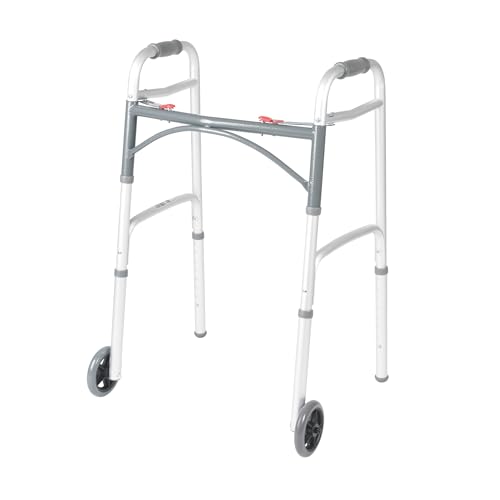- Walkers & Rollators
- Our Quality Guarantee
- Last Updated November 30, 2025
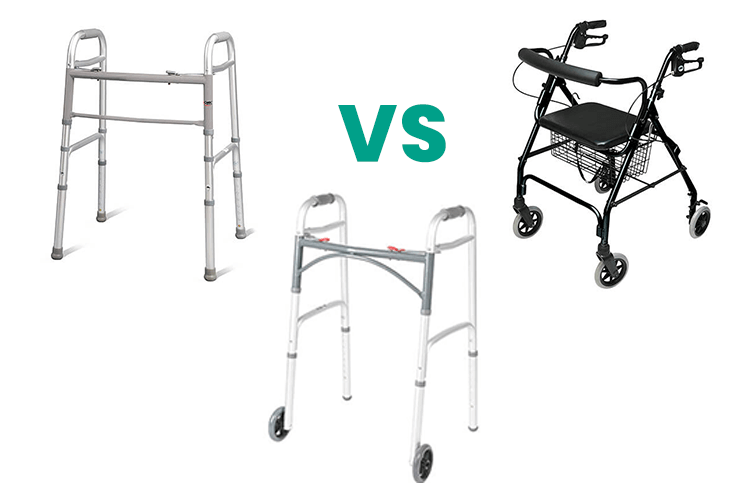
Different Types of Walkers Compared: Standard vs. 2-Wheel vs. Rollator Walkers (Differences and Alternatives)
Walkers are frames designed for those people (usually senior citizens and the disabled) who require additional stability and support while walking. There are many different types of walkers available today. Each of them has a different design, with specific functions and features. The most prominent types include standard, 2-wheel, and rollator walkers.
In This Article
The Difference Between Standard Walkers, 2-Wheel Walkers, and Rollator Walkers
The difference between these walkers is that standard walkers are the most basic type, consisting of a metal frame that the user must pick up and place. On the other hand, 2-wheel style and rollator walkers include wheels that make them more mobile and easier to use. While 2-wheel walkers have 2 wheels, rollators usually have 3 or 4.
From another perspective, each type of walker has different functions, and they are built for different users and situations.
| Features | Standard Walkers | 2-Wheel Walkers | Rollator Walkers |
|---|---|---|---|
| Mobility | Low | Moderate | High |
| Stability | High | Moderate | Moderate to Low |
| Terrain Adaptability | Indoor use preferred | Indoor and limited outdoor | Versatile (indoor & outdoor) |
| Braking System | Not Applicable | Not Applicable | Yes |
| Weight Bearing Capacity | High | High | Moderate to High |
| Added Features (like seats) | No | No | Yes |
| Weight of Walker | Light | Moderate | Heavier |
| Ease of Transportation | Easy | Easy | Moderate (due to extra features) |
| Price Range | $ – $$ | $$ – $$$ | $$$ – $$$$ |
| Best for | Stability, Indoor use | Moderate mobility, Indoor use | High mobility, Feature-rich |
The 5 Top-Rated Walkers for Seniors
| Editor's Picks | Walker | Rating |
|---|---|---|
| 1. Best Overall Walker for Seniors | Helavo Bariatric Walker with Large Seat | 4.7/5 |
| 2. Best Lightweight Walker | Hugo Mobility Explore Side-Fold Rollator Walker | 4.5/5 |
| 3. Best Narrow Walker | Planetwalk Premium 3 Wheel Rollator | 4.6/5 |
| 4. Best Budget Pick | /Medline Folding Rollator: Seat & 6" Wheels Included | 4.5/5 |
| 5. Best Standard Walker | OasisSpace Compact Folding Walker | 4.6/5 |
What is a Standard Walker?
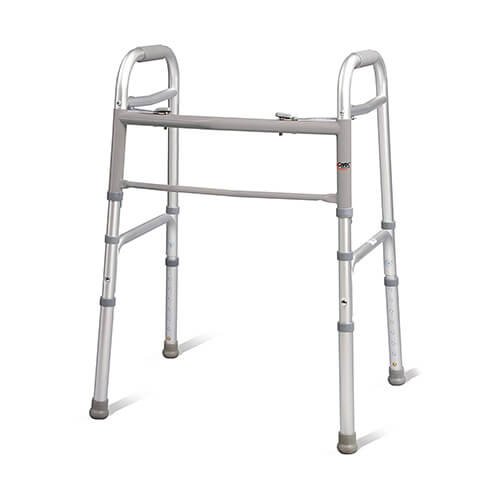
- Folding Walker: The Drive Medical 2-Button Standard Foldable Walker offers...
- Sturdy Aluminum Construction: Built from durable aluminum, this lightweight...
- Enhanced Assistance & Comfort: The improved cross-frame design allows users to...
When stability is your top priority, Standard Walkers take the cake. Priced generally between $30 to $100, they offer:
- Robust and sturdy design for top-notch balance
- Ideal for independent mobility issues
- Better suited for long distances compared to wheeled counterparts
Handgrips: Soft vs. Rigid Foam
Those handgrips aren’t just a design feature; they’re your lifeline. Standard Walkers usually come with:
- Soft rubber foam grips, easier on the hands but wear out faster
- Rigid foam grips that last longer but might be less comfortable
- Costs for replacement grips range from $10 to $25
Portability: Fold & Go
Most Standard Walkers come with a folding mechanism, making them easy to:
- Stow in a car
- Store in tight spaces
- Note: Foldable models are generally $10 to $20 more expensive
Styles & Usability: Choices Galore
From junior to heavy-duty styles, Standard Walkers offer a range to suit varied needs. What’s more:
- Generally made of aluminum or steel
- Better suited for indoor use, making them perfect for homebodies
Lightweight & Easy Storage: The Icing on the Cake
Among walkers, these are some of the lightest, weighing between 5 to 7 lbs. This translates to:
- Easier lifting and storage
- Less hassle during transportation
In the universe of Standard Walkers, every feature aims to make your life simpler and more secure. Whether it’s the customizable handgrips, the ease of portability, or the built-in stability, these walkers are designed with your comfort and convenience in mind.
What is a Two-Wheel Walker?
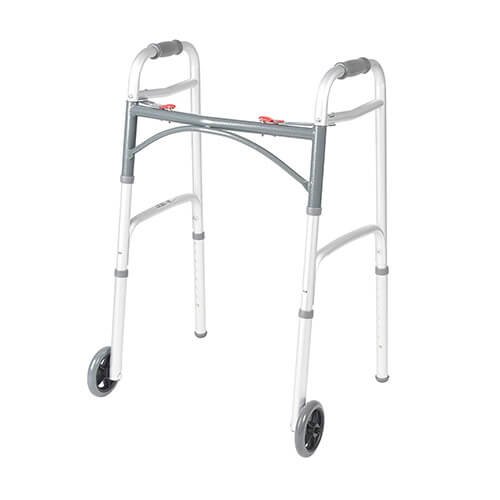
- Enhanced Mobility Assistance: The Drive Medical Folding Walker supports...
- Lightweight Strength: Enjoy dependable walking support from this walker, built...
- Smooth Multi-Surface Use: Move confidently with this walker, equipped with...
How It Works: Mechanics & Movement
2-Wheel Walkers, generally priced between $50 and $120, are engineered for continuous movement. Here’s the deal:
- Users lean their weight on the walker, facilitated by wheels measuring usually 5 inches in diameter.
- Rubber-tipped legs add friction to prevent runaway rolling.
- No lifting required; ideal for those who find lifting a Standard Walker strenuous.
Compact & Portable: Easy as Pie
Their compact design sets 2-Wheel Walkers apart, which can fold down to dimensions as small as 24 x 20 x 3 inches. This makes them ideal for:
- Transporting in car trunks with less than 3 cubic feet of space
- Storing in closets narrower than 24 inches
Terrain Compatibility: Know the Limits
While they may seem like all-terrain champs, 2-wheel Walkers have their limitations. Key specifics:
- Operate best on flat surfaces, like hardwood floors and asphalt.
- Small wheels are not designed for rocky or rough terrains; they can get stuck in gaps larger than 2 inches.
Assembly & Adjustments: A Piece of Cake
Forget about spending hours on assembly. Most 2-wheel Walkers come 95% assembled out of the box. All you might need to do is:
- Attach the handles, which usually require just a Phillips screwdriver.
- Adjust the height, with options usually ranging from 31 to 39 inches.
Who Stands to Benefit? Customized Comfort
2-Wheel Walkers can be a game-changer for people with mobility limitations or slower walking speeds. Here’s how:
- Weight capacities usually range from 250 to 350 lbs
- It can increase the walking speed of slow movers by up to 20%, thanks to the front wheels.
With 2-Wheel Walkers, it’s not just about making movement possible—it’s about making it efficient and tailored to your needs. From the ease of assembly to the nuances of terrain compatibility, every detail is designed with user benefit in mind.
What is a Rollator Walker?
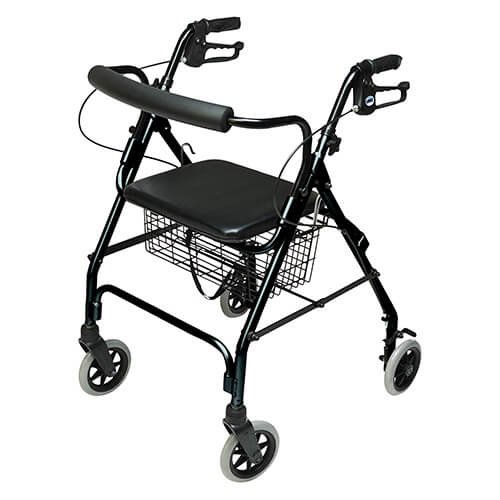
- Lightweight and Easy to Handle – At just 14.5 pounds, this rollator is one of...
- Compact Frame for Tight Spaces – Measuring only 27.5” wide with 16”...
- Comfortable for Petite Users – Height-adjustable handgrips (32"–37") and a...
Rollators offer multi-functionality, but often at a price range of $100 to $300. If you find yourself needing to pause frequently during walks for rest or to catch your breath, a rollator could be your go-to. Besides, you can jazz it up with accessories like:
- Attachable Shopping Bags (around $20-$50)
- Clip-on Baskets (approximately $30-$60)
Weight Considerations
When it comes to weight, rollators are no lightweight matter. They often come with weight capacities ranging from 250 to 400 lbs. Keep in mind:
- Heavier capacity rollators weigh around 20-25 lbs
- Lighter models can weigh as little as 12-15 lbs
- A heavier rollator means reduced mobility
Variety & Customization
From the plethora of rollator options, height-adjustable models are a standout, costing around $150-$250. These come with:
- Handlebars adjustable from 31 to 41 inches
- Seats adjustable from 18 to 24 inches
- Suitable for users between 5′ and 6’4″ in height
Three-Wheel Wonders
If tight spaces and narrow halls are your concern, three-wheel rollators, priced at $80-$200, are your answer. These lighter models:
- Weigh between 10-15 lbs
- Offer easier navigation in spaces less than 24 inches wide
- Lack built-in seats, sacrificing some comfort for agility
When choosing a rollator, the devil’s in the details—from your budget to your body weight, and from your height to your living space. Zeroing in on these specifics can lead you to a rollator that’s just right for you. Always consult a healthcare provider for tailored advice to fit your unique needs.
Recommended Walkers
| Editor's Picks | Walker | Rating |
|---|---|---|
| 1. Best Overall Walker for Seniors | Helavo Bariatric Walker with Large Seat | 4.7/5 |
| 2. Best Lightweight Walker | Hugo Mobility Explore Side-Fold Rollator Walker | 4.5/5 |
| 3. Best Narrow Walker | Planetwalk Premium 3 Wheel Rollator | 4.6/5 |
| 4. Best Budget Pick | /Medline Folding Rollator: Seat & 6" Wheels Included | 4.5/5 |
| 5. Best Standard Walker | OasisSpace Compact Folding Walker | 4.6/5 |
As the above shows, there are differences between the three types of walkers we’ve covered. Standard walkers are best for people who need balance assistance and have decent upper-body strength. Wheeled walkers are best for many others. Each type of walker is suitable for a different kind of person. For this, the person’s age, the extent of mobility, and weight should be considered.
Exploring Walker Alternatives
Navigating through the maze of mobility aids? While walkers are a trusted companion for many, there’s a whole world of alternatives out there, each with its unique flair and function. Let’s dive into some of these options.
1. Canes
Imagine having a stylish, lightweight friend who’s always ready to offer a helping hand. That’s what a cane feels like! It is convenient for those who need just a bit of support to walk confidently. Whether it’s the classic single-point cane, perfect for negotiating everyday terrains, or the sturdy quad cane that stands by you like a rock, there’s something for every need. It’s like having a companion who doesn’t mind being swung around, is ready to fit into any nook or cranny, and is always up for a walk in the park!
2. Crutches
Have you ever had one of those days when you need a shoulder to lean on? Crutches can be that reliable buddy, especially if one of your legs isn’t in its best form. They’re the go-to for a sprained ankle or post-surgery recovery, shifting your weight and letting that sore leg catch a break. Yes, it takes a bit of upper body mojo to swing with these, but once you’ve got the hang of it, you’re moving!
3. Wheelchairs
For those days when walking feels like a marathon, wheelchairs swoop in like a cozy, rolling embrace. Picture yourself cruising in a manual one, with the freedom to roam at your pace, or an electric wizardry ready to zip at the flick of a joystick. With cushioned seats, sturdy wheels, and the adaptability to roll over various terrains, it’s like your personal chariot of comfort.
4. Scooters
Perfect for those who can walk but get pooped quickly. With a comfy seat, easy controls, and nifty features like baskets to stash your stuff, it’s freedom on wheels. Shopping malls, parks, and neighborhood strolls just got much more exciting!
5. Knee Walkers
Remember the joy of riding a scooter as a kid? Knee walkers bring back that thrill with a dash of comfort. It’s the superhero that swoops in when one leg is down, letting you scoot around with grace. With padded supports and easy steering, it’s the epitome of moving in style without sweat.
The Differences Between Walkers and their Alternatives
| Criteria | Walkers | Canes | Crutches | Wheelchairs | Scooters | Knee Walkers |
|---|---|---|---|---|---|---|
| Support Level | High | Moderate | Moderate to High | High | Moderate | Moderate |
| Mobility | Moderate | High | High | Low (manual), High (electric) | High | High |
| Indoor Use | Excellent | Excellent | Good | Good | Moderate | Excellent |
| Outdoor Use | Good | Good | Good | Excellent | Excellent | Good |
| Comfort | Good | Good | Moderate | Excellent | Excellent | Excellent |
| Upper Body Strength Required | No | No | Yes | No | No | No |
| Portability | Good | Excellent | Excellent | Moderate | Moderate | Good |
| Price Range | $$ | $ | $ | $$$ | $$$ | $$ |
Making The Choice
Choosing between a walker and its alternatives isn’t a one-size-fits-all deal. It’s about listening to your body, understanding your needs, and picking what fits your daily life like a glove. Whether it’s the simplicity of canes, the support of crutches, the comfort of wheelchairs, the freedom of scooters, or the ease of knee walkers, each has its song to sing. And remember, when in doubt, chatting with your healthcare professional can turn those question marks into confident strides forward!
Articles You May be Interested In:





